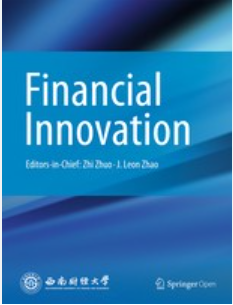生态足迹和可再生能源的使用对南亚国家金融稳定的影响
IF 7.2
1区 经济学
Q1 BUSINESS, FINANCE
引用次数: 0
摘要
本研究探讨了 2000 年至 2022 年期间南亚国家的生态足迹、能源使用、碳排放、治理效率、经济繁荣和金融稳定之间的复杂关系。我们采用了横截面依赖性检验、协整分析、第一代和第二代单位根检验等多种方法,使用了面板自回归分布滞后模型、可行的广义最小二乘法和面板校正标准误差,以确保研究结果的稳健性。我们发现几个变量之间存在值得注意的正相关关系,包括生态意识的提高、有效的治理结构、人均 GDP 的增加以及二氧化碳排放量的增加。这些关系为加强整个地区的金融稳定性提供了潜在的途径;它们还凸显了采用生态可持续实践来加强经济韧性的潜在潜力。我们的研究结果还强调了适当的治理结构和较高的收入水平在增强南亚国家金融稳定性方面的关键作用。有趣的是,我们还发现了与可再生能源的使用相关的负系数,这表明可再生能源的应用升级可能会造成金融不稳定。这一发现强调了能源战略多样化的重要性,告诫政策制定者在寻求减少碳排放的同时,应仔细考虑进口可再生能源可能带来的高成本金融后果,强调需要在雄心勃勃的可持续发展目标和追求该地区持续经济稳健性之间取得平衡。在考虑这些发现的影响时,关键是要考虑每个国家更广泛的社会经济背景。我们的研究结果为决策者制定可再生能源战略提供了宝贵的见解。本文章由计算机程序翻译,如有差异,请以英文原文为准。
The implications of the ecological footprint and renewable energy usage on the financial stability of South Asian countries
This study explores the complex relationships involving ecological footprints, energy use, carbon emissions, governance efficiency, economic prosperity, and financial stability in South Asian nations spanning the period from 2000 to 2022. Employing various methodologies such as cross-sectional dependence tests, co-integration analysis, and first- and second-generation unit-root tests, we use a panel Autoregressive Distributed Lag model, feasible generalized least squares, and Panel Corrected Standard Errors to ensure the robustness of our findings. We find noteworthy positive correlations between several variables, including heightened ecological consciousness, effective governance structures, increased GDP per capita, and amplified CO2 emissions. These relationships suggest potential pathways to strengthen the financial stability of the entire region; they also highlight the latent potential of embracing ecologically sustainable practices to fortify economic resilience. Our results also underscore the pivotal role of appropriate governance structures and higher income levels in bolstering financial stability in South Asian countries. Interestingly, we also find negative coefficients associated with the use of renewable energy, suggesting that escalating the adoption of renewable energy could create financial instability. This finding stresses the importance of diversification in energy strategies, cautioning policymakers to carefully consider the financial ramifications of potentially costly imports of renewable energy sources while seeking to reduce carbon emissions, emphasizing the need to strike a balance between ambitious sustainability goals and the pursuit of sustained economic robustness in the region. In considering the implications of these findings, it is crucial to consider each country’s broader socioeconomic context. Our results offer valuable insights for policymakers in developing renewable energy strategies.
求助全文
通过发布文献求助,成功后即可免费获取论文全文。
去求助
来源期刊

Financial Innovation
Economics, Econometrics and Finance-Finance
CiteScore
11.40
自引率
11.90%
发文量
95
审稿时长
5 weeks
期刊介绍:
Financial Innovation (FIN), a Springer OA journal sponsored by Southwestern University of Finance and Economics, serves as a global academic platform for sharing research findings in all aspects of financial innovation during the electronic business era. It facilitates interactions among researchers, policymakers, and practitioners, focusing on new financial instruments, technologies, markets, and institutions. Emphasizing emerging financial products enabled by disruptive technologies, FIN publishes high-quality academic and practical papers. The journal is peer-reviewed, indexed in SSCI, Scopus, Google Scholar, CNKI, CQVIP, and more.
 求助内容:
求助内容: 应助结果提醒方式:
应助结果提醒方式:


